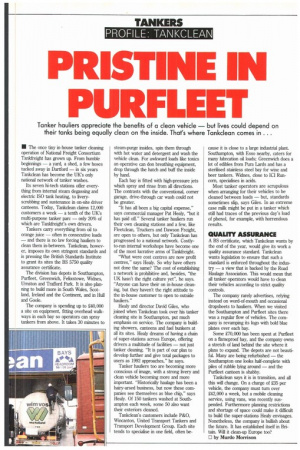PRISTINE IN PURFLEET
Page 61

If you've noticed an error in this article please click here to report it so we can fix it.
Tanker hauliers appreciate the benefits of a clean vehicle — but lives could depend on their tanks being equally clean on the inside. That's where Tankclean comes in ...
• The once tiny in-house tanker cleaning operation of National Freight Consortium Tankfreight has grown up. From humble beginnings — a yard, a shed, a few hoses tucked away in Dartford — in six years Tankclean has become the UK's only national network of tanker washes.
Its seven hi-tech stations offer everything from internal steam degassing and electric ISO tank heating, to liveryscrubbing and sustenance in on-site driver canteens. Today, Tankclean claims 12,000 customers a week — a tenth of the UK's multi-purpose tanker parc — only 20% of which are Tankfreight's own drivers.
Tankers carry everything from oil to orange juice — often in consecutive loads — and there is no law forcing hauliers to clean them in-between. Tankclean, however, imposes its own stringent standards and is pressing the British Standards Institute to grant its sites the BS 5750 quality assurance certificate.
The division has depots in Southampton, Purfleet, Greenwich, Felixstowe, Widnes, Umston and Trafford Park. It is also planning to build more in South Wales, Scotland, Ireland and the Continent, and in Hull and Goole.
The company is spending up to £40,000 a site on equipment, fitting overhead walkways in each bay so operators can spray tankers from above. It takes 30 minutes to steam-purge insides, spin them through with hot water and detergent and wash the vehicle clean. For awkward loads like toxics an operative can don breathing equipment, drop through the hatch and buff the inside by hand.
Each bay is fitted with high-pressure jets which spray and rinse from all directions. The contrasts with the conventional, corner garage, drive-through car wash could not be greater.
"It has all been a big capital expense," says commercial manager Pat Healy, "but it has paid off." Several tanker hauliers run their own cleaning stations and a few, like Fleetdean, Truckers and Dawson Freight, are open to others, but only Tankclean has progressed to a national network. Costlyto-run internal workshops have become one of the most lucrative arms of Tankfreight.
"What were cost centres are now profit centres," says Healy. So why have others not done the same? The cost of establishing a network is prohibitive and, besides, "the UK hasn't the right culture yet", he says. "Anyone can have their on in-house cleaning, but they haven't the right attitude to the in-house customer to open to outside hauliers."
Healy and director David Giles, who joined when Tankclean took over his tanker cleaning site in Southampton, put much emphasis on service. The company is building showers, canteens and fuel bunkers at all its sites. Healy dreams of having a chain of super-stations across Europe, offering drivers a multitude of facilities — not just tanker cleaning. "It is part of our plan to develop further and give total packages to users as 1992 approaches," he says.
Tanker hauliers too are becoming more conscious of image, with a strong livery and clean vehicle becoming more and more important. "Historically haulage has been a hairy-arsed business, but now these companies see themselves as blue chip," says Healy. Of 150 tankers washed at Southampton each week, some 50 also want their exteriors cleaned.
Tankclean's customers include P&O, Wincanton, United Transport Tankers and Transport Development Group. Each site tends to specialise in one field, often be
cause it is close to a large industrial plant. Southampton, with Esso nearby, caters for many lubrcation oil loads; Greenwich does a lot of edibles from Pura Lards and has a sterilised stainless steel bay for wine and beer tankers. Widnes, close to ICI Runcorn, specialises in acids.
Most tanker operators are scrupulous when arranging for their vehicles to be cleaned between loads — but, standards sometimes slip, says Giles. In an extreme case milk might be put in a tanker which still had traces of the previous day's load of phenol, for example, with horrendous results.
QUALITY ASSURANCE
A BS certificate, which Tankclean wants by the end of the year, would give its work a quality assurance standard. Tanklean wants legislation to ensure that such a standard is enforced throughout the industry — a view that is backed by the Road Haulage Association. This would mean that all tanker operators would have to clean their vehicles according to strict quality controls.
The company rarely advertises, relying instead on word-of-mouth and occasional dropsheets to hauliers. When we visited the Southampton and Purfleet sites there was a regular flow of vehicles. The company is revamping its logo with bold blue plates over each bay.
Some 270,000 has been spent at Purfleet on a flameproof bay, and the company owns a stretch of land behind the site where it plans to expand. The depots are not beautiful Many are being refurbished — the Southampton one looks half-complete with piles of rubble lying around — and the Purfleet canteen is shabby.
Tankclean says it is in transition, and all this will change. On a charge of 235 per vehicle, the company must turn over £42,000 a week, but a mobile cleaning service, using vans, was recently suspended. Furthermore planning restrictions and shortage of space could make it difficult to build the super-stations Healy envisages. Nonetheless, the company is bullish about the future. It has established itself in Britain. Will it clean-up Europe too?
O by Murdo Morrison
















































































































